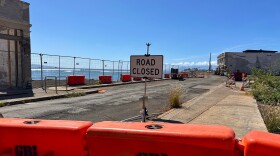This week the nation's highest court announced it would hear a case concerning the discharge from a wastewater treatment plant in Lahaina. The case has potentially huge impacts for water pollution rules nationwide. At the center of the debate is how to regulate treated wastewater being injected underground.
The Lahaina Wastewater Reclamation Facility first opened in 1975, with a second plant coming online in 1985. The facility processes up to 5 million gallons of sewage each day before releasing the treated wastewater.
That wastewater is disposed of via several onsite underground injection wells. When the facility was built, Maui County opted for the injection wells rather than a direct outflow pipe into the ocean. The county believed this was a more environmentally safe option, a position it still maintains.
That type of discharge is not regulated under the 1972 Clean Water Act, which only covers discharge into surface water sources. But a 2012 study from a University of Hawaii geologist proved indisputably that effluent from the Lahaina facility was reaching the ocean.
Near-shore ocean waters are covered by the Clean Water Act. That laid the foundation for a lawsuit by a group of Maui-based environmental groups. The Hawaii Wildlife Fund was joined by the Sierra Club Maui, the Surfrider Foundation, and the West Maui Preservation Association in their lawsuit against Maui County. The group, represented by environmental law firm Earthjustice, won in federal court and again in the 9th Circuit Court of Appeals.
However, the court ruling was fairly narrow. It only asserted that injected effluent from the Lahaina wastewater facility was covered by the Clean Water Act. No judgement was issued on the any environmental impact of that discharge.
Maui County maintains that the discharge is safe and not responsible for coral decline or algae blooms that have been found in the area. The plaintiffs represented by Earthjustice are not convinced and have vowed to press forward with their suit.
On Tuesday, the U.S. Supreme Court announced that it would consider the case in its fall term. Two other federal appeals courts issued conflicting rulings on similar issues in South Carolina and Kentucky. The so-called “circuit split” will likely force the Supreme Court to resolve the issue.
Acting EPA Administrator Andrew Wheeler has publicly opposed expansion of Clean Water Act protections. The Trump Administration moved last year to rollback an Obama era regulation that would have extended those protections to groundwater.
Hawaii Public Radio's Casey Harlow contributed to this reporting.




